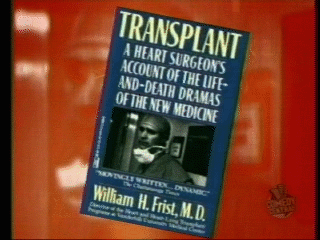This ought to clear it up for you.
(via
Strata Lucida)
His superiority complex ought to complement his God complex quite nicely.
Category Archives: Bye-Bye Frist
Bill Frist – Cat Killer – Daily Show Clip
Jon Stewart does his usual classy job of making light of the horrible truth about Republican Senate Majority Leader Bill Frist
(the quote below is from Frist’s own autobiography):

Bill Frist – Cat Killer (Hi-res 23 MB)
Bill Frist – Cat Killer (Med-res 18 MB)
Bill Frist – Cat Killer (Lo-res 12 MB)
Bill Frist – Cat Killer (MP3 – 3 MB)

Bye-Bye Frist
Ugh. I don’t even know what to say. I knew Frist had to have a skeleton in his closet somewhere, but this is pretty ghastly.
I’m not a Republican. Nevertheless, with the Republicans in the majority, I am very concerned about who will be the leader of the Republican Party in the Senate.
A med student who had a nervous breakdown and started kidnapping and killing cats from the pound to finish his thesis is arguably less than stable enough to lead a political party. What else might he consider necessary for the greater good of something or other when he inevitably cracks under the pressure of office? Forget it.
Come on Shrub. Is this the best you can do? Is the Republican party so morally bankrupt that a cat killer with a god complex is the best leader you can find?
Keep looking.
Daschle, Beware: Young Dr. Frist Sliced Up Cats
by Ron Rosenbaum for the Observer.
Then he (Frist) adds this somewhat contradictory sentence: “Humane societies might object, and I would agree if the issue was the humane treatment of animals. But the issue was human lives.” (Why isn’t it both?)
He tells us of the rewards: “It can even be beautiful and thrilling work, as I discovered that day in the lab when I first saw the wonderful workings of a dog’s heart …. I spent days and nights on end in the lab, taking the hearts out of cats, dissecting each heart, suspending a strip of tiny muscle that attaches the mitral valve to the inner wall of the cat heart and recording the effects of various medicines I added to the bath surrounding the muscle.”
At times, he gives evidence of borderline grandiosity: “I was, for the first time in my life, making original discoveries. No one else in the history of man had ever done exactly what I was doing”-although he concedes in the same paragraph (again, it’s somewhat contradictory) that his project was “really very basic,” not “some grand breakthrough.”
Nonetheless, “[a]s I watched the little strip of muscle beat hour after hour through the night in the basement of the hospital, I felt quite pure, as if I were reaching out and touching some eternal truth of nature.”
But the contemplation of eternal truth was threatened, alas, by something mundane: “I lost my supply of cats. I only had six weeks to complete my project before I resumed my clinical rotations. Desperate, obsessed with my work, I visited the various animal shelters in the Boston suburbs, collecting cats …. ”
“Collecting cats”? What this euphemism elides over is that Mr. Frist apparently posed as someone who wanted to adopt kittens and strays. He asked the shelter people to trust him, he asked the poor shivering creatures in their cages to trust him, and then he “cart[ed] them off to the lab to die.” (Sounds like the way the new majority leader is likely to treat the hapless Democratic minority in the Senate. Indeed, one of the most frequent quotes in my Google search compared the job of Senate Majority Leader to that of “herding cats.”)
And here’s the telling detail I hadn’t seen quoted in any of the stories on the episode: He took them home, “treating them as pets for a few days,” before taking them to the lab to cut them open.
Treated “them as pets for a few days” before “carting them off to the lab to die.” Well, he does say it was “totally schizoid,” but it’s hard to imagine those few days: the way he briefly builds a relationship of trust with the trusting little creatures, gets to know them as pets. Lets them, at last, begin to feel safe and loved after a hard life on the mean streets. (Does he give them names before he kills them?) One tries to conjure up the scenes of domestic closeness between the young Dr. Jekyll and his little charges. And then the day arrives when the cat carrier comes out again, and the furry little creature begins to suspect what’s in store. To those poor felines Frist was a lying “Joe Millionaire.” (I’m told that, for good reason, most medical researchers who work with animals try to maintain a strict separation in their mind between pets they cuddle and lab animals they cut up.)
Yes there are specific laws against this kind of premeditated kidnapping, torture and murder of animals. Yes. If Frist had been found out at the time, he would have undoubtedly been prosecuted under whatever laws were available at the time.
I was only sensitized to the question when I came to know Liz Hecht, the animal-rights activist and former director of Citizens for Alternatives to Animal Labs Inc., which has had some success in getting local New York hospitals to adopt more humane procedures. Ms. Hecht was always justly outraged by reports of the widespread practice of lab-animal “suppliers” who used Frist-like methods to essentially kidnap animals from shelters and private yards and sell them to medical-research facilities.
She referred me to the outreach director for the American Anti-Vivisection Society (www.aavs.org), Crystal Spiegel, who said that three states still have “pound seizure laws,” which actually allow anyone with some sort of research-supply license to show up at a shelter and demand any number of rescued creatures to take to labs for dissection and experiment. A reading of the current Massachusetts animal-welfare law (which passed apparently after Mr. Frist’s own “catnappings”), suggests that what the Senate Majority Leader did back then would be illegal now. And it’s not just an isolated practice even now, alas. Ms. Hecht recommended a sobering book by Judith Reitman called Stolen for Profit: The True Story Behind the Disappearance of Millions of America’s Beloved Pets, which documents the way unscrupulous suppliers of lab animals steal pets from yards and sell them for dissection.
More…
“In short, I was going a little crazy.”
I don’t know if that implicit invocation of Dr. Jekyll and Mr. Hyde is just a “little crazy” or more deeply disturbing. I searched the Internet hoping to find more details about these cat kidnapping incidents, but most sources had picked up on the quote in the Globe because the Frist book was strangely not just out of print, but virtually nonexistent on major online Web sites like Amazon. (Mr. Frist has a new book out on bioterrorism, but there’s no customary referral to this previous book). The Globe reporter told me that he consulted a used-book specialist who found him a copy, but now they’re not available, even from those specialists. I put out calls to several sources to see if I could find the book, which is called Transplant: A Heart Surgeon’s Account of the Life-and-Death Dramas of the New Medicine. I wanted at least to find the relevant pages on the cat-stealing and see if there were more telling details about this disturbing episode. Meanwhile, I found myself fascinated by several items that turned up on a Google search of “Bill Frist” and “cats.”
One of them was the strange encounter between former cat-killer Frist and the cat-killing Capitol gunman. It happened on July 24, 1998, and was to become the signature moment in the creation of the Frist media legend as heroic surgeon-Senator.
Do you remember that story? Some nut job named “Rusty” Weston-who at one point claimed to be an illegitimate son of J.F.K. and the subject of death threats from Bill Clinton-tried to shoot his way into the Capitol building, fatally injuring two Capitol police officers while being shot badly himself. At the time of the shooting, Bill Frist was presiding over the Senate. He rushed to the scene, worked with the emergency ambulance crews to stabilize the shooting victims, and actually rode in the ambulance with the badly injured shooter. Although Mr. Frist didn’t know at the time who was the shooter and who the victim, he did his best to stabilize Mr. Weston and keep him alive till he got to the hospital.
It would later turn out that before he made his fatal journey to the Capitol, Mr. Weston had methodically shot dead some 14 of his family’s cats. One account of the shooting had the line: “We know a lot more now than we used to about angry boys who kill cats for sport.” It was a reference to studies that seemed to show that many serial killers and other psychopaths showed their first signs of derangement by killing pets and small animals.
The irony was that scene in the ambulance: Although they’d taken different paths in life, one cat-killer was tended to by a person who had cat-killing in his past.
Which suggests the possibility that the cat-killing was a kind of transformative moment in Mr. Frist’s life, a moment in which, Lord Jim-like, he saw something in himself that he wished to turn against, to transcend, and so began devoting his life to reparative deeds.